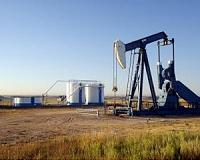 |
Baghdad (UPI) Jun 3, 2010 Iraq plans to upgrade scores of oil wells and drill dozens of new ones as part of Baghdad's ambitious drive to quadruple production from major oil fields now operated by Exxon Mobil, Royal Dutch Shell, Eni of Italy and other foreign companies. The government wants to boost output from the current level of around 2.1 million bpd to 10 million-12 million bpd over the next six years, with the proceeds funding national reconstruction. Some in the energy industry see that as overly ambitious, in part because of the lack of infrastructure, and likely to trigger major problems with the Organization of Petroleum Exporting Countries. To do this, Iraq auctioned off 20-year production contracts for 11 major oil fields in 2009 to secure massive investment from foreign oil companies to develop its long-neglected, war-battered energy industry. If all goes to plan, Iraq would be catapulted from being the 11th ranking producer to rival Saudi Arabia as the world's top oil state. It's an immense task. Iraq currently has reserves estimated at 115 billion barrels, the fourth largest in the world. But it has vast untapped field that could contain as much oil again, enough to maintain production well into this century as other countries' reserves shrink. Exxon Mobil and Royal Dutch Shell plan to overhaul as many as 50 wells this year and drill eight new wells at the giant West Qurna Phase One oil field to boost production from the current 225,000 barrels per day. The field contained an estimated 8.7 billion barrels in 2009. The consortium has pledged to set a baseline production level of 244,000 bpd, increasing this to 2.325 million bpd within a few years. Production at West Qurna, which began in the late 1990s, peaked at 400,000 bpd before the U.S.-led invasion of March 2003 but slipped significantly because of declining pressure, which pushes the oil to the surface. Exxon plans to introduce a water injection system at West Qurna Phase One, as well as other major fields at Majnoon, Zubair and Halfaya, which also have pressure problems. Other foreign companies, including Eni, are also discussing water injection at Zubair, which has reserves estimated at 4 billion barrels. The consortium led by Eni aims to overhaul around 100 wells this year in the first phase of its development plan. The group agreed on a baseline output of 183,000 bpd when it secured its 20-year contract. It plans to eventually produce 1.2 million bpd. Shell is also part of a consortium with Malaysia's state-owned oil company Petronas that won the Majnoon field in eastern Iraq, which contains an estimated 12.8 billion barrels. Shell has pledged to boost production from a paltry 46,000 bpd to 1.7 million bpd. LUKoil, Russia's largest private oil company, says it will begin large-scale drilling next year at the vast West Qurna 2 oil field, which contains the equivalent of 13 billion barrels. That would produce an estimated 440,000 barrels per day. But Vice President Leonid Fedun said LUKoil expects to eventually produce some 8 million to 10 million tons of oil a year. LUKoil holds a 56.25 percent stake in West Qurna 2 in a consortium with Norway's StatoilHydro, 18.75 percent, and the Iraqi state-owned North Oil Co., with 25 percent. The consortium has pledged to invest $30 billion in the field, which was discovered in 1973. Dhiya Jaafar, head of the state-run South Oil Co., said May 27 that Baghdad expects crude output from the southern fields -- Rumaila, Majnoon and West Qurna Phase One -- to hit 2.1 million bpd by the end of 2010. Rumaila, operated by BP and the China National Petroleum Corp., has reserves of 17.8 billion barrels. BP says it aims to hike the current production level of 1 million bpd to 3 million bpd by 2020. Jaafar said SOC expects output at the Nasiriyah field in the south to reach 100,000 bpd in 2014. Current output is 10,000 bpd, but Jaafar says that should go up to 50,000 bpd in the second half of 2011. SOC decided to develop that field, with reserves estimated 5 billion barrels, on its own after negotiations with a consortium led by the Nippon Oil Corp. of Japan broke down over financing. To reach these production targets SOC plans to drill at least 10 new wells this year.
Share This Article With Planet Earth
Related Links Powering The World in the 21st Century at Energy-Daily.com
 Canadian Research Examines Effects Of Scientific Claims On Oil
Canadian Research Examines Effects Of Scientific Claims On OilAlberta, Canada (SPX) Jun 03, 2010 A University of Alberta researcher says people generally do not act on information about the effects fossil fuel-based products are having on the environment. And the reason, says English and film studies researcher Imre Szeman, is because of the way discussions on environmental issues are structured. In a recently published study, Szeman says the main assumption among scientists-that with ... read more |
|
| The content herein, unless otherwise known to be public domain, are Copyright 1995-2010 - SpaceDaily. AFP and UPI Wire Stories are copyright Agence France-Presse and United Press International. ESA Portal Reports are copyright European Space Agency. All NASA sourced material is public domain. Additional copyrights may apply in whole or part to other bona fide parties. Advertising does not imply endorsement,agreement or approval of any opinions, statements or information provided by SpaceDaily on any Web page published or hosted by SpaceDaily. Privacy Statement |